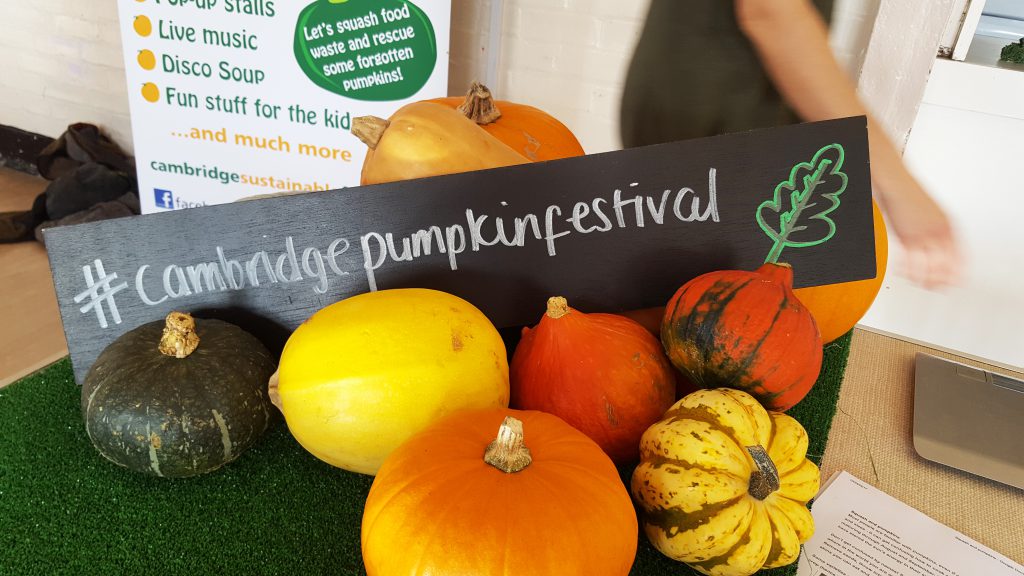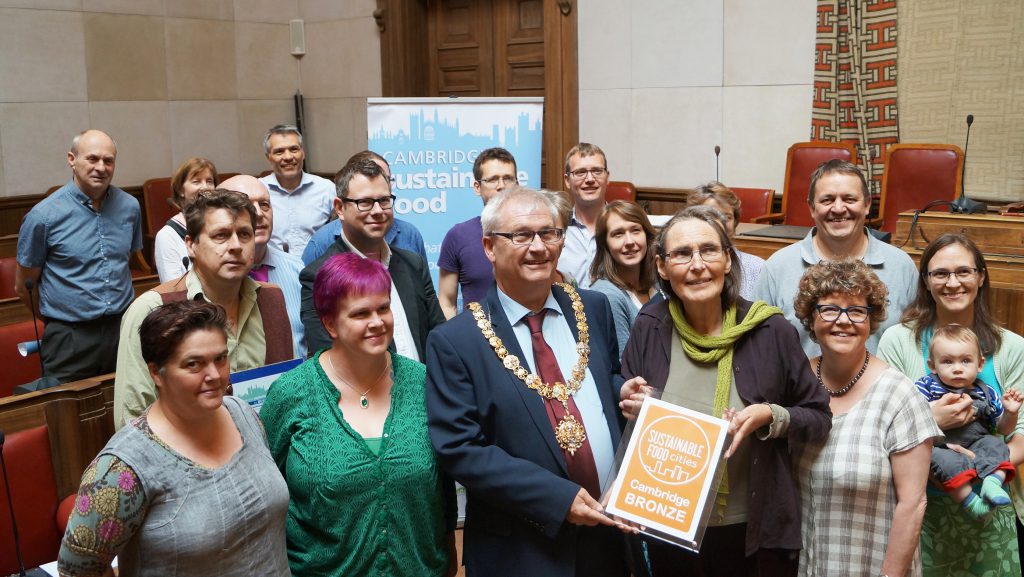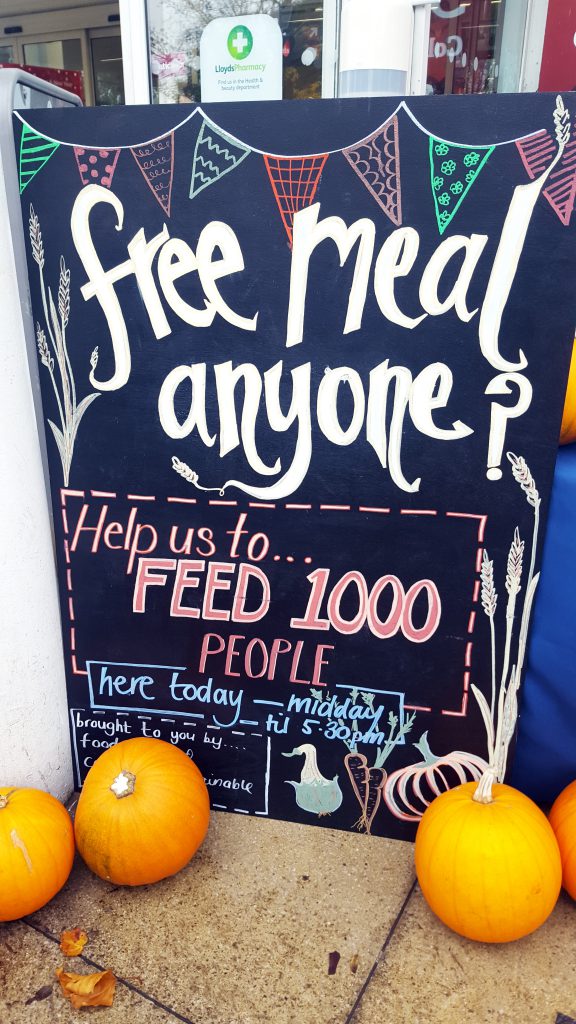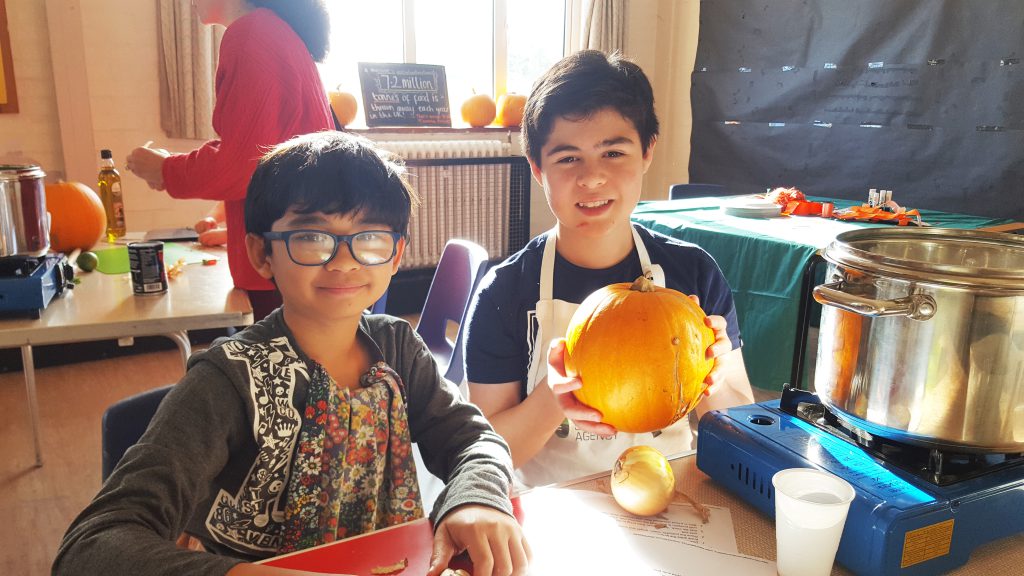Cambridge sustainable food: The recipe for a sustainable city
Cambridge Sustainable Food are tackling poverty, climate change and ill health through food, and making their city a better place to live in.
By Rute Costa
“With a background in environmental sustainability, grassroots activism, and running food businesses I am totally committed to food that is good for us and good for the planet”. Sam Dyer, sitting in front of me at a crowded bookshop cafe, is talking about the path that led her to Cambridge Sustainable Food (CSF). Her role as Food Partnership Coordinator is a recently created post, she explains, as the organisation only just received funding for it; but her “project working”, as I understand it, has been crucial to CSF for more than a couple of years now.

There is a lot to learn about Cambridge Sustainable Food, but my curiosity traces back to the roots of its creation. Sam reveals the full story: CSF was set up four years ago after a big public meeting, placing Cambridge alongside other UK cities in the national Sustainable Food Cities Network. This network is run by Sustain, Food Matters and the Soil Association, three organisations connected by their goal to achieve sustainability through food. To become a Sustainable Food City, Sam explains, “there is a set of criteria that you are working towards: food poverty, access to growing spaces, local business work, sourcing and supply chain, tourism, public health – this huge range of everything that contributes to what a sustainable food city might look like”. Due to the variety of aspects food touches on, CSF are an umbrella organisation bringing together different partners: from the City Council to catering managers, pediatric dietitians, local businesses, and everyone in between. They make up a strong committee working towards a common goal. Sam sees excitement where I cannot overlook the stress of putting on so many hats: “I love the challenge! I think it’s great, it’s never dull!”
“There is a set of criteria that you are working towards: food poverty, access to growing spaces, local business work, sourcing and supply chain, tourism, public health – this huge range of everything that contributes to what a sustainable food city might look like.”

This enthusiasm, alongside hard work from the entire team, is the key for their success: “we are the only volunteer led Sustainable Food City in the country to have a Bronze Award for the whole city!”, Sam is delighted to tell me. Now they are stepping up their game and aiming for Silver. The committee have spotted the aspects of food sustainability in Cambridge that need the most addressing and are directing funding to improve them. Every year they have a particular focus: last year it was CO2 reduction, through offering alternatives to and cutting down on meat and dairy consumption; this year it is food waste reduction; next year they are targeting food poverty. The words “It’s so broad!”, come out of my mouth as I realise how food connects so many dots, and is at the root of social, economic and environmental issues. Sam emphasises that food is also partly the key to solving them: “it gives you a chance to work on lots of different aspects, and then you can think about drawing them all together into what true sustainability means”. Food has a vital role in preventing and reducing diet-related ill-health, food poverty and waste, climate change, biodiversity loss, declining prosperity and social dislocation. Sam adds that it is also a form of “cultural and artistic expression for communities and families”, an efficient way to fight social isolation, by bringing people together to talk about these issues.
Overall food waste costs UK households £12.7 billion pounds every year. CSF packed 2017 with initiatives that aim to diminish that figure through encouraging waste reduction. Their Pumpkin Festival was a huge success, gathering forces from a large number of local businesses and organisations, and setting up 18 events to raise awareness about food waste. Sam tells me about the success of the Kid’s Disco Soup, where 140 people, parents and children, cooked surplus food and danced the afternoon away. Another extremely successful endeavour has been the Community Fridge at the Edge Cafe, where individuals, businesses and supermarkets can donate their spare food to be redistributed to the community. “The good thing about the community fridge is that it’s egalitarian, it can be accessed by anybody”, Sam explains. In the first two weeks alone, it took 50 kilos out of the waste room to be redistributed. Alongside the Zero Waste Kitchen Challenge, Sam also wants to reenact a competition blast from the past: ‘I am hoping to engage Alex from Foodcycle in a Ready, Steady, Cook challenge with me, using only surplus ingredients from the fridge’. Campaigns have extended to college and university catering, and businesses are being encouraged to work with waste monitoring and measurement tools. From one-off entertaining events to long-term commitments, CSF is conducting great work to reduce waste and benefit the community.
“The good thing about the community fridge is that it’s egalitarian, it can be accessed by anybody.”

Certain CSF projects are ongoing, Sam clarifies. The Business Pledge Award and the cookery workshops don’t fall under a specific focus of food sustainability, instead they tackle a broad range of food-related issues. About twenty businesses in the city have taken a pledge to become more sustainable, working on aspects such as “local sourcing, organics, meat and dairy reduction, community engagement, healthier options, and waste management”, and are then awarded based on their progress. Sam has been involved in CSF’s cookery workshops for a few years, and she is happy to tell me about its impact: “a core group of four or five families have been coming for two years now. They’ve been great, […] their confidence has grown, their knowledge of food has grown, they even have their own Facebook group where they post recipes and ideas”. CSF also organises six-week workshops around sustainability, cooking from scratch, budgeting, environmental awareness, health and hygiene, directed specifically at the young families who will most benefit from it. These are designed to help them eat cheaply and healthily – Sam tells me that the cheapest meal they produced was 39p a portion. Recently, they have started workshops with older people: “It’s actually incredible to see, particularly the older men who never learned to cook – they love it!”. In feedback forms they have read comments like “you have changed my life” and “this is the best part of my week”. Sam unveils one of the reasons why: “It’s all about social inclusion through food. In all the sessions we do, we sit down at the end and share the food everybody has cooked”.
“It’s all about social inclusion through food. In all the sessions we do, we sit down at the end and share the food everybody has cooked.”
Cambridge Sustainable Food’s work is ever-expanding to improve the lives of even more people. Next year’s focus is food poverty, and their goal is to put together an alliance in Cambridge. Sam explains at the moment there are quite a few front line services at work with people in food poverty – food banks, Foodcycle, homeless shelters, the council. However, there is no mechanism allowing them to cooperate and complement each other, or to follow the same action plan. CSF wants to change that. “My personal dream”, Sam tells me, “is to have mini food hubs all around the city, which would either have a community fridge, fresh produce, or cookery workshops, nutritional advice and help”. I ask her what they need in order to achieve that, and she responds: “community engagement, funding and skilled volunteers”. That is the recipe for a sustainable city.

Visit their page and projects to learn more about sustainable food initiatives, and support their incredible work.
